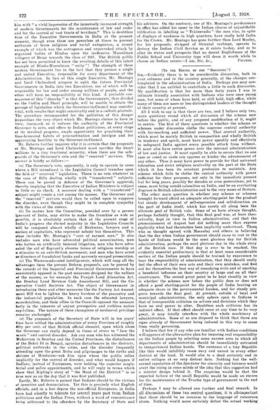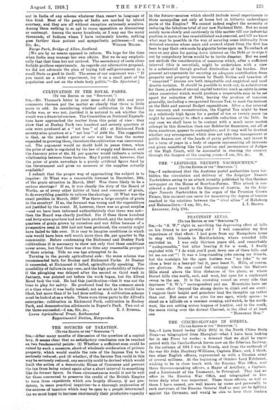ITO THE EDIFOR OF THE " SPECT&TOR."1
SIR,—Evidently there is to be considerable discussion, both in your columns and in the country generally, of the changes con- templated in the administration of India. Perhaps you may con- sider that I am entitled to contribute a little to such discussion. My qualification is that for more than forty years I was in intimate friendly association with Indians who were once young men, but some of whom have held, or still hold, high office, while many of them are more or less distinguished leaders of the thought of their country at present.
All I wish to say is that there are two, and I believe only two, main questions round which all discussion of the scheme now before the public, and of any proposed modification of it, ought to centre. The first of these questions is whether the scheme or schemes under discussion clothe the supreme central authority with far-reaching and sufficient power. That central authority, which must be mainly British in composition and wholly British in tendency and spirit, must have power speedily and effectively to safeguard India against every possible attack from without. It must also have entire power over the internal administration of law and justice. It must equally be able to secure that no one race or creed or caste can oppress or hinder the advancement of any other. Thus it must have power to provide for that universal toleration and strict religious neutrality on the part of the State which it has been its constant profession to maintain. Any scheme which fails to clothe the central authority with power sufficient for these purposes, not only in the immediate present but for long years, possibly for decades or even generations, yet to come, must bring untold calamities on India, and be an everlasting disgrace to British administration and to the very name of Britain.
The other main question is whether any scheme or schemes brought forward afford an adequate starting-point for the gradual but steady development of self-expression and self-direction on the part of India itself, which has surely all along been the ultimate goal of British rule. Some of us have always thought, perhaps foolishly thought, that this final goal was, at least theo- retically, kept in view in Indian administration, and that the pronouncement of August last did nothing more than express explicitly what had theretofore been implicitly understood. Thome who so thought agreed with Macaulay and others in believing that the day when Indian government should come to rest in the hands of Indiana would be the most glorious day •for British administration, perhaps the most glorious day in the whole story of the British race. If that day is ever to be reached, the evidently essential preliminary is that at least some considerable section of the Indian people should be trained by experience to bear the responsibility of administration, that they should really feel the effect of their own acts and their own mistakes, and find out for themselves the best way of remedying evils and of exerting a beneficial influence on their country at large and on all their countrymen. The second great point to be kept steadily in view is whether the scheme now before the public does or does not afford a good starting-point for the people of India bearing an adequate share in the governmental burden, and for steady pro- gress towards the final goal. At present, outside of local and municipal administration, the only sphere open to Indians is that of irresponsible criticism on actions and decisions which they have no real power to alter. Doubtless such criticism has its indirect effect. If that effect should come at any time to be very great, it may fatally interfere with the whole machinery of administration. Some of us are disposed to think that there are signs already of Government being induced in this way to cease from really governing.
I believe that few if any who are familiar with Indian conditions will approve of the alternative plan for imposing real responsibility on the Indian people by selecting some narrow area in which all departments of administration should be immediately entrusted to inexperienced Indian hands. The existence of a tiny Republic like this would infallibly rouse envy and unrest in every other district of the land. It would also to a dead certainty end in entire collapse at no very distant date. Nothing but the well- earned reputation of the Spectator for sincerity and fairness would avert the rising in some minds of the idea that this suggestion had a sinister design behind it. The suspicion would be that the expected failure of the small Republic would be made an excuse for the maintenance of the Trustee type of government to the end of time.
Perhaps I may be allowed one further and final remark. In all discussions of those two central questions, it is all-important that there should be no recourse to the language of rancorous abuse. Nothing would more certainly defeat the actual working
out in India of any soheme whatever than resort to language of this kind. Most of the people of India are marked by inbred courtesy, and they are all without exception extremely sensitive. Among them nothing is so apt to rouse opposition as discourtesy or contempt. Among the many hundreds, or I may say the many thousands, of Indians whom I have intimately known, nothing goes further than patient and sympathetic politenees.—I am, [We are by no means opposed to reform. We hope for the time when India may manage her own affairs. But we do say emphati- cally that that time has not arrived. The ascendancy of caste alone forbids perilous experiments. As regards our alternative proposal, we did not advocate the plan of trying full self-government in a small State as good in itself. The sense of our argument was : " If you insist on a risky experiment, try it on a small part of the population and not on the whole body politic."—En. Spectator.]



























 Previous page
Previous page